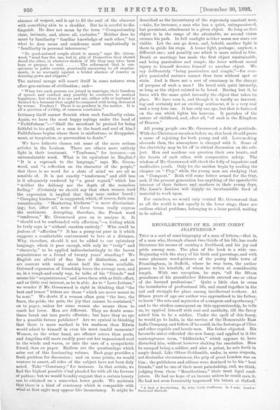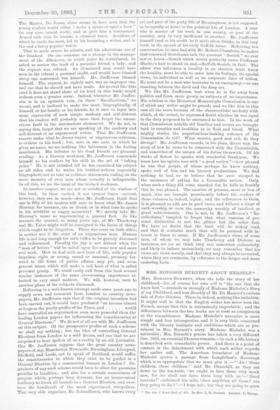RECOLLECTIONS OF MR. JOHN CORDY JE AFFRE SON.* This is
a sort of semi-biography of a man of letters,—that is, of a man who, through almost two-thirds of his life, has made literature his means of earning a livelihood, and his joy and pride among men. The plan of the book is a wide one. Beginning with the story of his birth and parentage, and with some pleasant word-pictures of the pretty little town of Framlingham, in Suffolk, where he was born, the author passes to his kinsfolk, of whom he writes at considerable length. With one exception, he says, "all the fifteen grandsons of his grandfather Edwards entered one or other of the learned professions." Quite a little clan to cross the boundaries of professional life, and stand together in the toil and struggle for place among intellectual workers. At fifteen years of age our author was apprenticed to his father, to learn" the arts and mysteries of a surgeon and apothecary," and to the studies consequent on this apprenticeship, he tells us, he applied himself with zeal and assiduity, till the fancy seized him to be a soldier. Under the spell of this fancy, he would go to India, in the service of the Honourable East India Company, and follow, if he could, in the footsteps of Clive and other capable and heroic men. His father objected. His favourite sister ridiculed the new fancy, and applied to it the contemptuous term, "fiddlesticks," which appears to have disturbed him, without however shaking his resolution. How he escaped being a soldier, and also a priest, he sets forth in ample 'detail. Like Oliver Goldsmith, under, in some respects, not dissimilar circumstances, the grip of great London was on him ; the publishers and editors were destined to be his " best friends," and he one of their most painstaking, and, we think, judging from these "Recollections," their most loyal coad- jutors. He had no hope of an income unless he could earn it. He bad not even favourably impressed his tutors at Oxford.
* A Book of Rocoltocfriono. by John Corey Jeaffroson, In 2 viols. London: Hurst and Blacked. The Master, Dr. Jeune, alone seems to have seen that the young student would either " make a spune or spoil a horn " (in any case, meant work), and so gave him a testimonial. Armed with this, he became a classical tutor. Accident, of which he made the most, led to his becoming a writer, and in the end a fairly popular writer. That he made errors he admits, and his admissions are of the frankest. On one occasion, on a change in the manage- ment of the Atheneum, to which paper he contributed, he asked to review the book of a personal friend, a lady ; and the request was refused. An ill-natured man would have seen in the refusal a personal slight, and would have blamed every one concerned but himself, Mr. Jeaffreson blamed himself. The request., he rightly says, was an improper one, and one that he should not have made. An avowal like this (and it does not stand alone of its kind in this book) would redeem even a greater error. Indeed, whenever Mr. Jeaffre- son is in an egotistic vein, (in these " Recollections," we mean), and is inclined to make the most, biographically, of himself, or his family, or his friends, he is sure to lapse into some expression of such simple modesty and self-distrust that his readers will probably more than forget the uncon- scious fault in the unconscious atonement. We do not, in saying this, forget that we are speaking of the modesty and self-distrust of an experienced writer. That Mr. Jeaffreson smarts under what he deems unjust or ungenerous criticism, is evident in his book ; but, save in one case, to whioh he gives no name, we see nothing like bitterness in the feeling manifested. His tributes to his dead friends are pleasant reading. As a literary workman, Mr. Jeaffreson commends himself to his readers by his skill in the art of "taking pains." He is not satisfied till he has examined his subject on all sides, and he warns his brother.writers (especially biographers) not to take as evidence statements resting on the mere memory of even men whose veracity is indisputable. In all this, we see the hand of the trained workman.
In another respect, we are not so satisfied of the wisdom of this book. In these excited, if not earnest times—earnest, however, they are in much—does Mr. Jeaffreson think that one in fifty of his readers will care to know what Mr. James Hannay, for instance, ate or drank, or in what tone he spoke in his mirthful or angry moments P We merely take Mr. Hannay's name as representing a general fact. In like manner, the quarrel, so many years ago, of Mr. Thackeray and Mr. Yates might well be consigned to the limbo of things which ought to be forgotten. There was error on both sides; in neither was it the error of an ungenerous man. Human life is not long enough for such trifles to be gravely discussed and rediscussed. Possibly the day is not distant when the "man of letters" will be called. upon for some new and more real work. How to deal with new laws of life, with popular impulses, right or wrong, sound or unsound, pressing for- ward to thne front of public affairs, may yet, and soon, present issues which will make a sad hash of what is called personal gossip. We could easily cull from this book several similar instances of the same overweening importance at- tached to very small matters. We will, however, turn to another phase of the subjects discussed.
Referring to a well-known attempt made some years ago to supply news and comment from London to country news- papers, Mr. Jeaffreson says that if the original intention had been carried out, it would have produced "an income almost as large as the yearly profits of the Times, and would have controlled an organisation even more powerful than the leading London papers for influencing the constituencies at General Elections." We do not at all see with Mr. Jeaffreson on this subject. Of the prospective profits of such a scheme we shall say nothing ; but the idea of controlling General Elections from London is a wild dream, and one that we are surprised to hear spoken of as a reality by an old journalist. Can Mr. Jeaffreson suppose that the great country news- papers of, say, Manchester, Newcastle, Birmingham, Liverpool, ,Sheffield, and Leeds, not to speak of Scotland, would suffer the constituencies in which they exist to be guided in a General Election by a commercial bureau in London P Or- ganisers of any such scheme would have to allow for questions peculiar to localities ; and also for a certain earnestness of purpose which, perhaps long dormant, has an inconvenient tendency to break all bounds in a General Election, and over- turn the handicraft of the most experienced wirepullers. That very able organiser, Mr. Schnadhorst, who knows every art and part of the party life of Birmingham, is not supposed to be equally at home in the political life of London. A man who is master of his work in one county, or part of the country, may be very inefficient in another. Mr. Jeaffreson himself (and to his credit be it said) of ten thinks, in this very book, in the speech of his early Suffolk home. Referring to a conversation he once had with Mr. Robert Chambers, he makes that renowned Scotchman talk the queerest " Scotch " we ever saw or heard—Scotch which would probably cause Professor Blackie's hair to stand on end,—Suffolk-Scatch, in fact. The editor who influences a locality in an election must know the locality, must be able to enter into its feelings, its special views, its individual as well as its corporate lines of action. He must not be a man who hesitates in an emergency,—as one standing between the devil and the deep sea.
We like Mr. Jeaffreson best when he is far away from politics and from mere gossip on subjects of no importance. His relation to the Historical Manuscripts Commission is one of which any writer might be proud; and we like him in this ease all the more because of the characteristic modesty with which, at the outset, he expressed doubt whether he was equal to the duty proposed to be entrusted to him. In the work of that Commission notable old families and events are brought back to counties and localities as in flesh and blood. What mighty stories the unpretentious-looking volumes of the Commission do tell! What secrets, good and evil, do they divulge ! Mr. Jeaffreson records, in his plain, direct way, the story of how he came to be connected with the Commission, and somewhat of the nature of hie duties therewith. Of his works of fiction he speaks with wonderful frankness. We learn how his spirits rose with a good review,"—how pleased he was that people, of whom perhaps he knew nothing, spoke well of him and his literary productions. We find nothing to lead us to believe that he ever stooped to the meanness of asking for a favourable review. Only, when such a thing did come, unasked for, he tells us frankly that he was pleased. The number of persons, more or less of mark, who are brought prominently before the readers of these volumes is, indeed, legion; and the references to them, it is pleasant to add, are in good taste, and without a tinge of rank-worship, or even the unworthy worship of intellect, or great achievements. One is not, in Mr. Jeaffreson's " Re- collections," tempted to forget that what remains of per- sonal distinction is not the glitter but the sober fact.
We have no doubt that the book will be widely read, and that it contains much that will be perused with in- terest in times to come. If Mr. Jeaffreson's views of some men, of whom we may take Thackeray and Dickens as instances, are (as we think they are) somewhat melancholy, and likely to induce melancholy, we may remember that his views are views merely, and that they may always be corrected, where they are erroneous, by reference to the larger and more enduring facts.



































 Previous page
Previous page